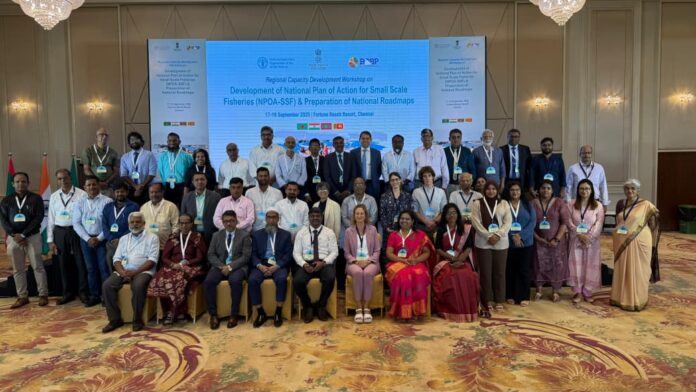India has called for climate justice and stronger international support for small-scale fisheries, underlining the disproportionate burden climate change places on countries and communities that contribute least to the crisis. The statement was delivered at the opening session of a regional meeting on fisheries governance organized by the Food and Agriculture Organisation (FAO) and the Bay of Bengal Programme Inter-Governmental Organisation (BOBP-IGO) in Chennai.
Union Fisheries Secretary Abhilaksh Likhi told delegates that small-scale fisheries form the backbone of coastal economies and cultures, but remain among the most vulnerable to climate shocks. “Those who contributed least to the problem should not be asked to pay the greatest price,” he said, stressing that extreme weather, sea-level rise, and ocean warming are already depleting fish stocks and eroding livelihoods.
The three-day meeting, running from September 17 to 19, is focused on guiding Bay of Bengal nations to develop National Plans of Action (NPOAs) for small-scale fisheries. Officials, scientists, and fisherfolk representatives from India, Sri Lanka, Bangladesh, and the Maldives are participating. The capacity-building initiative aims to align fisheries governance with FAO’s global guidelines on sustainability, gender equality, and climate resilience.
Likhi pointed out that India remains one of the lowest subsidisers of fisheries globally, while maintaining discipline in sustainably harnessing marine resources. He stressed that without international support, the poorest fishers lack the capacity to adapt to escalating challenges. The Secretary called for regional coordination on early warning systems, climate adaptation measures, and joint research initiatives.
India is preparing its own NPOAs for inland and marine fisheries with FAO and BOBP-IGO support. These plans are designed to ensure inclusive, climate-resilient growth for communities dependent on fisheries, balancing ecological sustainability with economic development.
Highlighting progress at the national level, Likhi noted that India’s fish production has doubled in the past decade, reaching 195 lakh tonnes in 2024–25. He credited the Pradhan Mantri Matsya Sampada Yojana (PMMSY), which has a total outlay of Rs 20,050 crore, with empowering women in the sector, extending insurance coverage to 31 lakh fish farmers, and funding modern fisheries infrastructure.
FAO’s International Fisheries Analyst, Dr. Lena Maria Westlund, highlighted the scale of small-scale fisheries in Asia, noting that they contribute nearly half of the region’s fish production and employ over 46 million people. She said the FAO guidelines emphasize community-based management, fair value chains, gender equality, and resilience in the face of climate change.
BOBP-IGO Director Dr. P. Krishnan reaffirmed the organisation’s role in helping member countries design tailored action plans. He noted that the regional approach is essential, given the shared challenges of overfishing, climate stress, and cross-border resource management in the Bay of Bengal.
The meeting has also spotlighted the cultural and nutritional role of small-scale fisheries. Delegates noted that beyond providing livelihoods, these fisheries are critical for food security in coastal communities, often supplying affordable protein to millions. However, rising fuel costs, market fluctuations, and environmental degradation threaten their viability.
Observers noted that India’s call for climate justice is significant, as it links global climate responsibility to local realities. By positioning small-scale fishers as defenders of food systems and culture, the country is drawing attention to the need for equitable solutions in global negotiations on climate and trade.
The Chennai meeting is expected to produce a framework to guide Bay of Bengal nations in drafting their NPOAs. For India, the outcome will feed into national strategies that aim to balance expansion of production with sustainability, ensuring that vulnerable fishing communities are protected even as the sector modernises.
As the conference continues, the discussions are reinforcing a central message: climate justice for fisheries is not only a matter of equity, but also of ensuring the long-term stability of food security, livelihoods, and marine ecosystems in the region.





